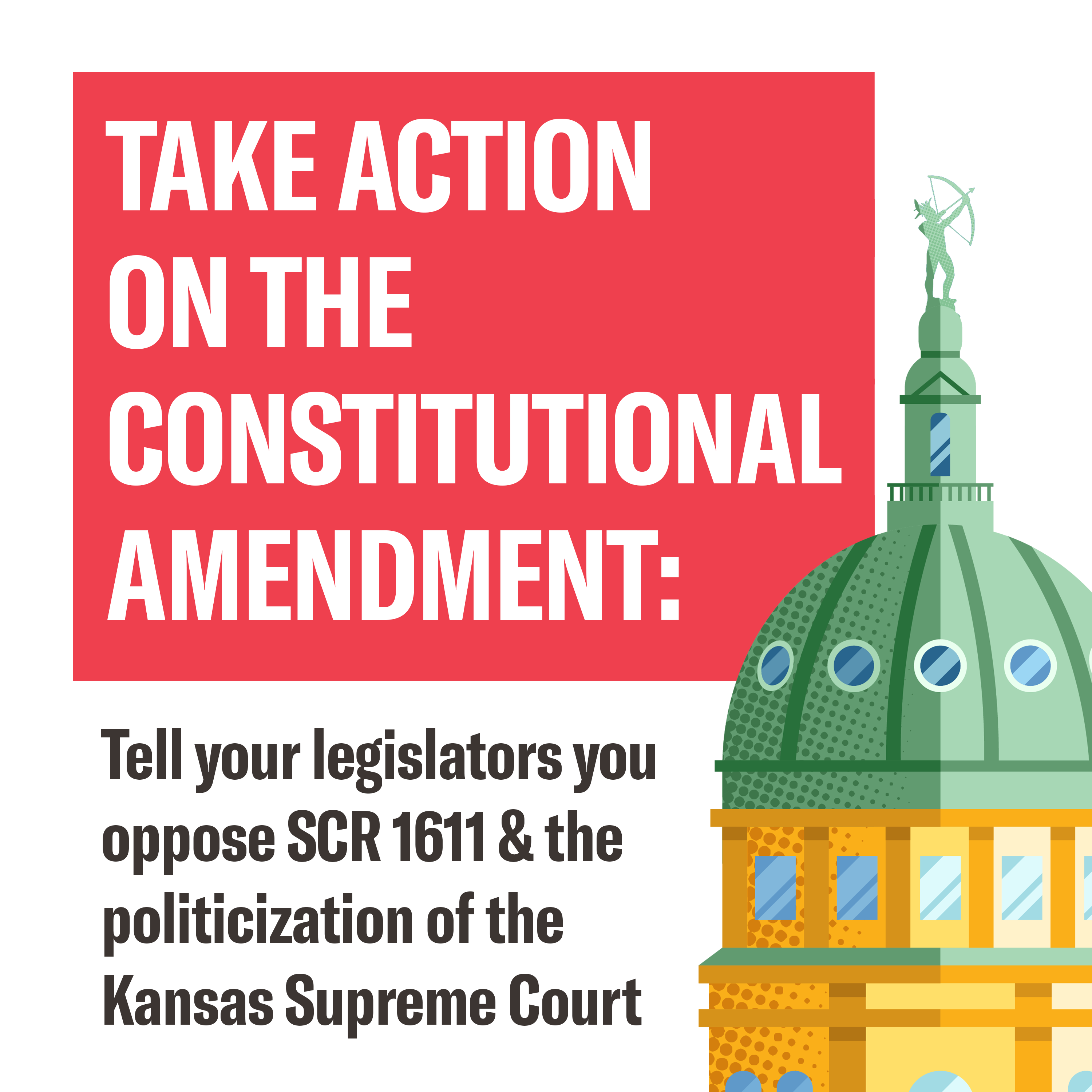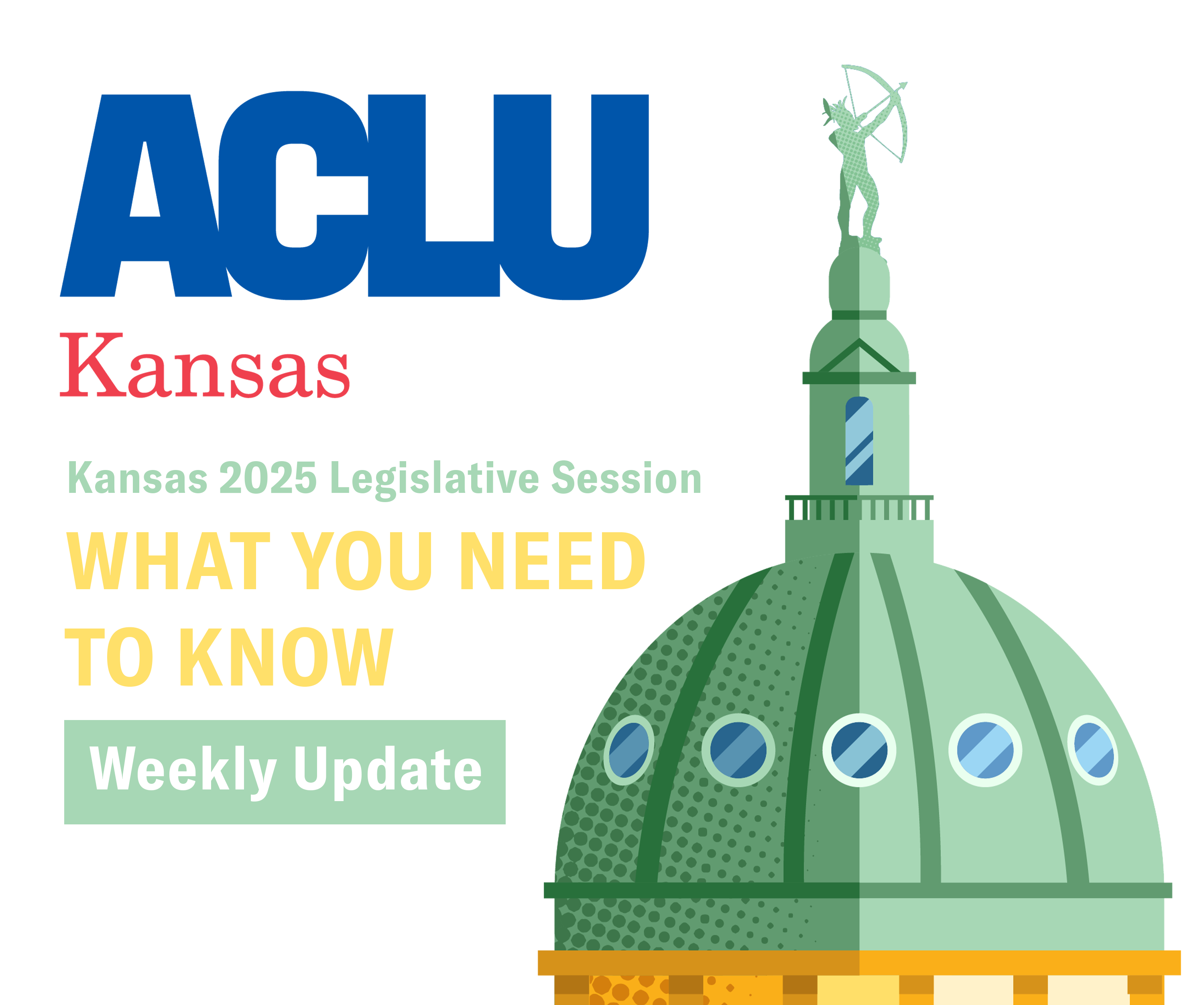The Kansas legislature has passed SB 4, a bill that eliminates the three-day mail processing period affixed to Election Day that allows fully eligible voters to have their mail ballots counted. It now goes to Governor Kelly to sign or veto.
This isn’t just an attack on our rights, it’s an affront to our core human sensibilities.
Kansas lawmakers created the ballot processing period in 2017 with nearly unanimous support. The logic was simple: mail delays posed an obstacle to voters, so this collection period was a safeguard so votes cast on time would still be counted.
Still, lawmakers, including the bill’s sponsor Rep. Pat Proctor, have spent over half the time since trying to overturn the law with yearly bills with specious reasoning. This time around, Proctor falsely claimed that thousands of ballots were thrown out for not being postmarked, but Loud Light’s investigation found that there were only 78 such occurrences in 2024.
Kansans love early voting; our polling shows that 70% believe politicians should focus on making voting more accessible; 65% believe counties should be required to offer the maximum-allowed early voting period; over half even support prepaid postage for mail ballots.
This year’s SB 4 passed both chambers of the legislature and was just vetoed by Governor Kelly. It’s up to us now to contact legislators and Governor Kelly to block the bill.
What a productive early voting bill might look like
Kansas state law currently only allows 20 days of advance voting. However, counties get to choose individually how many days of early voting they allow, and it can vary wildly from county to county.
Last year, Proctor introduced a convoluted bill that masqueraded as a compromise; it got rid of the mail collection period and moved up deadlines to register to vote but allowed early voting to begin three days earlier.
By suggesting they move up the start of early voting, Proctor is highlighting an important fact: there are no federal restrictions on how soon early voting can begin.
This gives Kansas lawmakers a tremendous amount of freedom to open up early voting. There were 91 days between the primary and the general election in 2024, which means there’s tremendous opportunity to allow Kansans to vote earlier.
In fact, election officials already are required to send out ballots 45 days before Election Day to military members and citizens living overseas. Since the ballots are ready and the systems underway already, we could mail out all early voting ballots at this time, no matter which county a voter lives in.
Working within the existing framework, we would suddenly have doubled the mail early voting period for Kansans.
You may call me a dreamer
My qualms with SB 4 go as deep as their baseline assumption in calling the mail collection period a “grace period.” This isn’t a favor from lawmakers to voters; this is one mechanism by which the legislature can do their most basic duty to make voting accessible.
Maybe lawmakers would realize it’s possible to make voting easier if they didn’t spend so much time making it harder.
Instead, Kansans receive a double portion of affront—lawmakers are not only working against the will of the people in making voting harder, but they insult the public with vapid rhetoric while discussing their true plans behind closed doors.
And now, after years of conniving, they have passed the bill and maintain the party numbers to override a possible Governor Laura Kelly veto.
I often wonder if others feel as out-of-place in the current zeitgeist as I do. We sit at the pinnacle of human achievement, armed with previously-unfathomable knowledge and technology, and constantly debate how poorly we can do things.
If we looked at the bounty of opportunity to make voting easier, we could do something truly impressive. Federal law affords tremendous opportunity to ensure every eligible voice is heard. Instead, we allow lawmakers to scheme and consolidate power, which is neither helpful nor impressive.
This year we fell into the same tired routine of anti-civil liberties legislation: asked our lawmakers not to pass this bill, contacted Governor Kelly to veto the bill, and now, we will urge lawmakers to sustain her veto and vote against an override, praying enough of them listen.
But I yearn for the day when we’re no longer mired by disingenuousness -- where we don’t propose ways to limit citizens’ voices while pretending we’re helping them, but instead actualize sincere plans to make sure they’re heard; where we don’t squabble over how to do the least possible, but rather survey the ways we can accomplish all that is possible for us.
I hope you’ll join me in doing everything we can to stop this insincere and harmful bill from becoming law. And I believe that when enough Kansans make our voices heard, our task will no longer be to simply impede these sinister ploys, but to implement productive plans to be the best that we can be; go to the stars, if you will.
Date
Thursday, March 13, 2025 - 10:30am
Featured image
Show featured image
Hide banner image
Related issues
Voting Rights
Show related content
Pinned related content
SB 4: 3-day Mail Processing Period
Tweet Text
[node:title]
Type
Menu parent dynamic listing
Show PDF in viewer on page
Style
Standard with sidebar
Show list numbers
Author
Jesse Kielman
This legislative session, extremist Senators are pushing a ballot initiative that would politicize the Kansas Supreme Court and open the door for special interest groups to buy their way into the Kansas judiciary. SCR 1611 proposes a constitutional amendment to provide for direct election of Supreme Court Justices and abolishes the current nonpartisan nominating commission.
“The Supreme Court should not be for sale to the highest bidder. If this passes, it will be a radical departure from Kansas’s longstanding commitment to judicial independence.” - Rashane Hamby, Policy Director for the American Civil Liberties Union of Kansas.
We cannot allow for the injection of politics into the courts. Switching to partisan elections for Kansas Supreme Court justices will not actually give power to the people; it will give power to those with the most money. When Ohio switched to partisan Supreme Court elections in 2022, hundreds of thousands of dollars from out-of-state special interest groups poured into Ohio to buy their preferred candidate’s success. By amending the state constitution to politicize the Kansas Supreme Court, we further risk encouraging those same practices in our state.
Right now, non-partisan experienced scholars, including retired Kansas Supreme Court justices, who know Kansas and our constitution, help guide judicial appointments. This amendment will replace these merit-based experts with extreme politicians and special interest groups. In replacing experts with politicians, we risk eroding the legitimacy of an allegedly nonpartisan judiciary as well as public trust.
Furthermore, we can also look to the intent of this resolution as an indicator of extremist policies influencing our Kansas politics.
Less than three years ago, Kansans voted to enshrine abortion rights under our Kansas constitution. Now, the extremists backing this amendment are trying to remake the court so they can ignore the will of the people and ban abortion without exceptions in Kansas. Attorney General Kris Kobach himself has made it clear that his efforts to overhaul the court are in retaliation to the 2022 decision on abortion, stating the makeup of the court makes it “very difficult” for him to win cases and advance his preferred policies.
We must protect the rights of all Kansans to make personal decisions without the influence of Kris Kobach and his extremist allies.
We cannot allow this Kobach power grab to happen. The fate of our reproductive and civil rights depends on it. Take action on SCR 1611 by clicking here or by visiting our 2025 Legislative Resource Hub and clicking the take action link. It takes less than 1 minute to contact your legislator and make your voice heard, TODAY.
Date
Thursday, March 6, 2025 - 11:45am
Featured image
Show featured image
Hide banner image
Show related content
Pinned related content
2025 Legislative Hub
Tweet Text
[node:title]
Type
Menu parent dynamic listing
Show PDF in viewer on page
Style
Standard with sidebar
Show list numbers
Author
Alina Matejkowski
Civil liberties continue to be the target of the Kansas legislature. This remains a multi-front assault. Attacks on voting access and singling out immigrant communities have all been on the docket this week. Take a look at what you might have missed week seven of the Kansas 2025 Legislative Session:
Senate Bill 254 (SB 254): Prohibition of Public Benefits to Undocumented Immigrants
We opposed SB 254, which seeks to prohibit individuals without lawful immigration status from accessing in-state tuition rates. This bill would not only strip opportunities from hardworking Kansas students but also create a two-tiered justice system that disproportionately harms immigrant communities. Beyond education, SB 254 amends the statute governing pretrial release, to introduce a dangerous rebuttable presumption of flight risk for undocumented individuals charged with a crime.
Senate Bill 4 (SB 4): Elimination of the Three-Day Mail Ballot Processing Window
SB 4 eliminates the current three-day processing window that allows mail-in ballots postmarked by Election Day to be counted. We vehemently oppose this bill, as it would disenfranchise thousands of Kansas voters, particularly those in rural areas, the elderly, and individuals with disabilities who rely on mail-in voting. Removing this processing window ignores potential postal delays and imposes undue burdens on voters, effectively suppressing voter participation and undermining the democratic process. Our opposition testimony, detailing the adverse impacts of SB 4, can be found on our website.
Senate Concurrent Resolution 1611 (SCR 1611): Proposal for Direct Election of Supreme Court Justices
SCR 1611 proposes a constitutional amendment to start holding direct, partisan elections for Kansas Supreme Court justices and eliminate the current, independent selection system. We strongly oppose this resolution, as it threatens the impartiality and independence of our judiciary. Introducing partisan elections into the judicial selection process would subject judges to political pressures and campaign financing influences, thereby compromising their ability to make unbiased decisions based solely on the law. Our detailed testimony outlining these concerns is available on our website.
Week Ahead: Kansas Legislature (March 4 - March 8, 2025)
The Kansas Legislature continues advancing restrictive policies affecting civil rights, education, and immigration. This week, several bills will be heard that threaten diversity initiatives, immigrant protections, and the rights of transgender students. The ACLU of Kansas will be closely monitoring and testifying against measures that undermine fundamental rights.
On Tuesday, the House Commerce, Labor, and Economic Development Committee will hear HB 2290, the Kansas Land and Military Installation Protection Act. This bill seeks to prohibit foreign entities from acquiring land near military sites. The ACLU of Kansas opposes this legislation due to its vague definitions, which could allow for arbitrary enforcement. Additionally, it risks fueling xenophobic narratives by disproportionately targeting specific nationalities. Similar legislation in other states has had unintended economic consequences, deterring international businesses from investing in local economies.
On Wednesday, the House Education Committee will consider SB 76, which mandates that school employees use the name and pronouns that align with a student’s birth certificate. The ACLU of Kansas strongly opposes this bill, as it directly targets transgender and non-binary students by denying them the right to have their identities recognized in school settings. This policy could contribute to increased mental health risks, including depression and anxiety, and may conflict with federal Title IX protections against sex-based discrimination. School districts enforcing this policy could face legal challenges and liability issues.
On Thursday, the Senate Federal and State Affairs Committee will hear SB 178, which would require Kansas law enforcement agencies to enter into agreements with U.S. Immigration and Customs Enforcement (ICE) for the enforcement of federal immigration laws. The ACLU of Kansas opposes this bill due to its harmful impact on community safety. Research has shown that when local police are required to enforce federal immigration laws, immigrant communities are less likely to report crimes, leading to decreased public safety for everyone. Additionally, the policy could result in racial profiling and place significant burdens on local law enforcement agencies, diverting resources away from addressing local crime.
Also on Thursday, the Senate Judiciary Committee will hear HCR 5008, a proposed constitutional amendment that would grant the legislature greater authority to oversee and veto executive branch regulations. The ACLU of Kansas opposes this amendment, as it threatens the separation of powers and could lead to political interference in public health, environmental, and labor protections. If passed, this measure would require voter approval, setting up a significant political battle in the upcoming election cycle.
DEI attacks continue
The ongoing fight over diversity, equity, and inclusion (DEI) funding remains a major issue, as the Senate Budget Committee recently stripped $4 million from the Governor’s budget and the Department of Administration, placing the funds under the State Finance Council until proof is provided that DEI programs and policies have been eliminated. This move reflects a broader nationwide effort to dismantle diversity initiatives in government and education.
As the week unfolds, the ACLU of Kansas will continue to advocate against legislation that undermines civil rights and liberties. The organization remains committed to ensuring that the voices of impacted communities are heard and that legal challenges are pursued where necessary.
Date
Tuesday, March 4, 2025 - 5:45pm
Featured image
Show featured image
Hide banner image
Show related content
Pinned related content
2025 Legislative Hub
Tweet Text
[node:title]
Type
Menu parent dynamic listing
Show PDF in viewer on page
Style
Standard with sidebar
Show list numbers
Author
Rashane H.
Pages


